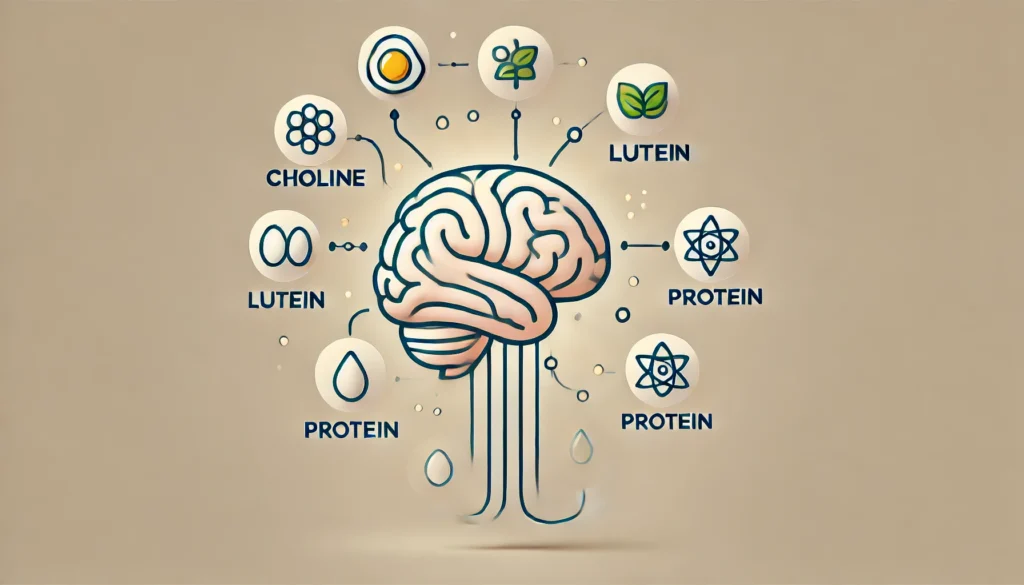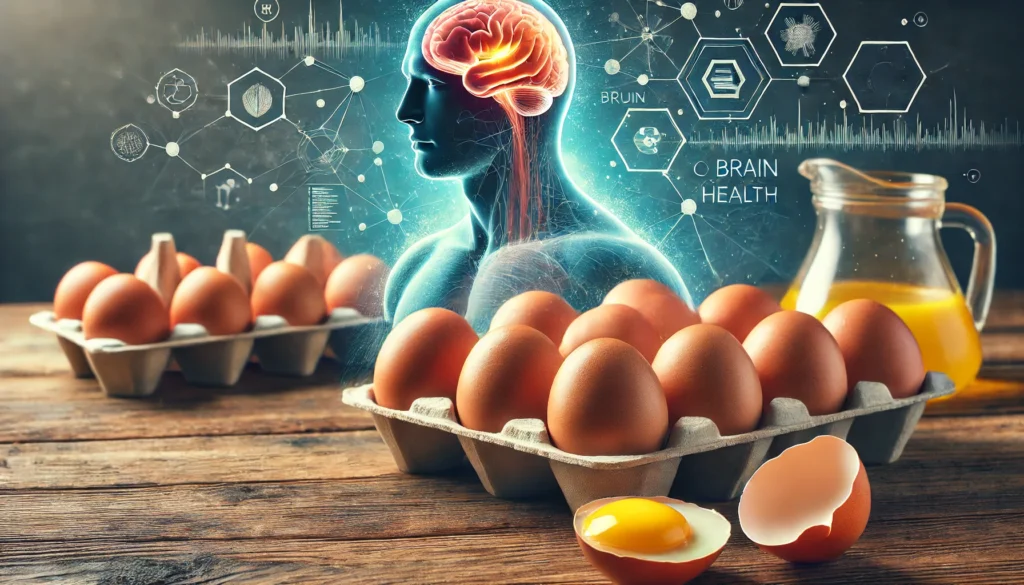Understanding the Relationship Between Eggs and Brain Health
The connection between eggs and brain health has been the subject of increasing scientific interest over the past few decades. Many people wonder, are eggs good for your brain, and emerging research suggests that they may indeed play a significant role in supporting cognitive function. Eggs, long celebrated for their nutritional richness, are packed with essential compounds like choline, lutein, and high-quality proteins—all of which are deeply intertwined with brain structure and cognitive processes. Understanding how eggs and brain health are connected involves unpacking the biological pathways through which these nutrients influence memory, learning, and neuroprotection.
You may also like: Where to Buy Bacopa Monnieri: How to Find Quality Supplements for Cognitive and Memory Support
When we talk about eggs and brain interactions, it is important to appreciate the complexity of the brain itself. This organ, which consumes about 20% of the body’s energy despite accounting for only 2% of its weight, is highly metabolically active and demands a steady influx of nutrients to maintain its function. Eggs provide several key components that meet these demands. For example, choline, an essential nutrient found in abundance in egg yolks, is a critical building block for acetylcholine, a neurotransmitter involved in memory and muscle control. Scientific evidence suggests that individuals with higher choline intake may experience better cognitive performance, which strongly hints at the potential of eggs as brain food.
However, not all discussions about eggs brain food are unequivocally positive. Some researchers and nutritionists raise concerns about cholesterol levels, particularly in older adults, prompting questions like, are eggs bad for seniors brains? While older dietary guidelines once cautioned against high cholesterol foods, more recent studies have nuanced this view, showing that dietary cholesterol does not impact blood cholesterol as dramatically as once thought for most individuals. This nuanced understanding is essential in evaluating the real impact of eggs on long-term brain health across different life stages.
It is equally important to address whether eggs are good for seniors brains specifically, as aging populations are particularly vulnerable to cognitive decline. The protective compounds found in eggs could offer substantial benefits, provided they are consumed as part of a balanced and healthy diet. Whether looking at prevention strategies for neurodegenerative diseases or supporting everyday cognitive clarity, eggs emerge as a compelling food to consider.
Ultimately, the question of are eggs good for brain health invites a deep dive into both the biological mechanisms at play and the lifestyle contexts in which eggs are consumed. From young adults seeking mental sharpness to seniors aiming to preserve memory and executive function, the potential of eggs to support cognitive vitality merits a thoughtful, evidence-based exploration.
Frequently Asked Questions: Eggs and Brain Health
1. How exactly do eggs support brain development during early life stages?
Eggs play a critical role in brain development during pregnancy, infancy, and childhood because they supply high levels of choline, a nutrient vital for neural tube formation and long-term cognitive function. Numerous studies highlight that maternal choline intake significantly affects a child’s memory capacity and mental flexibility later in life, demonstrating the powerful link between eggs and brain health from the very beginning. In this early developmental window, ensuring adequate choline and lutein intake can build cognitive reserves that influence intelligence and executive functioning. When discussing whether eggs are good for your brain, it’s important to recognize that their impact begins even before birth. Early dietary strategies emphasizing eggs brain food could therefore shape lifelong cognitive outcomes.

2. Can eggs enhance learning abilities and not just memory retention?
While much focus is placed on how eggs improve memory, emerging research also suggests that eggs can sharpen learning abilities. Choline’s role in neuroplasticity—the brain’s capacity to form new connections—is pivotal for acquiring new skills and adapting to new information. Eating foods rich in choline, like eggs, can boost synaptic flexibility, which underpins learning processes. As a result, when people ask, are eggs good brain food, it’s worth noting that they may promote faster information processing and creative problem-solving, not just better memory. Thus, consuming eggs consistently could give learners a cognitive advantage in both academic and real-world settings.
3. Are there differences in how eggs affect memory in younger versus older adults?
Yes, the impact of eggs on brain health can vary across the lifespan. In younger adults, the nutrients in eggs mainly enhance working memory, mental agility, and learning speed. However, in older adults, the benefits shift toward preserving long-term memory and preventing structural brain decline. This is particularly important when evaluating are eggs good for seniors brains, as seniors are more susceptible to oxidative damage and inflammation that can impair memory. Meanwhile, concerns about are eggs bad for seniors brains have largely been mitigated by updated research showing that moderate egg consumption does not significantly raise dementia risk when part of a balanced diet.

4. How do eggs influence emotional health and brain resilience under stress?
Beyond memory, eggs may enhance emotional regulation and brain resilience under stress due to their supply of essential B vitamins and healthy fats. Chronic stress depletes neurotransmitters such as serotonin and dopamine, which are essential for mood balance and cognitive sharpness. Nutrients in eggs help sustain the biochemical pathways responsible for emotional stability and motivation. When evaluating the broader benefits of eggs and brain health, it’s clear that cognitive performance and emotional health are deeply interconnected. Eating eggs brain food may support not only memory but also mental endurance in the face of modern life’s challenges.

5. Is there a particular way to cook eggs to maximize their brain benefits?
6. Can eating too many eggs negatively impact brain health?
While moderate consumption supports cognitive vitality, excessive intake—particularly among individuals genetically predisposed to cholesterol sensitivity—could potentially exacerbate vascular issues linked to cognitive decline. It’s crucial to differentiate general recommendations from personalized nutrition strategies. While eggs deliver valuable compounds for brain function, balance remains key in answering whether eggs are good for brain health over the long term. Modern guidelines suggest that up to one egg per day is generally safe and beneficial for most adults without increasing risk for neurovascular complications. Concerns about are eggs bad for memory often stem from outdated assumptions rather than current evidence.
7. How do eggs compare to other brain-boosting foods like fish or nuts?
Eggs offer a unique profile that complements rather than competes with other brain foods. For instance, oily fish provide omega-3 fatty acids crucial for structural brain integrity, while nuts supply polyphenols and healthy fats that combat inflammation. Eggs, on the other hand, focus heavily on choline, vitamin B12, and lutein, offering a different set of cognitive advantages. When combined, these foods can form a powerhouse brain diet. Asking are eggs good for memory invites broader conversations about synergistic eating patterns that amplify the effects of eggs brain food when thoughtfully combined with other nutrient-dense options.

8. Are there populations who should limit egg intake for cognitive health reasons?
Some individuals with familial hypercholesterolemia or certain cardiovascular conditions may need to moderate egg consumption under medical supervision. Although most people tolerate dietary cholesterol well, a small subset experiences significant blood lipid changes that could, in turn, influence vascular health and cognitive outcomes. In these cases, it becomes reasonable to ask whether eggs are bad for seniors brains or whether alternative choline sources should be emphasized. Personalized assessments ensure that the cognitive benefits of eggs and brain nutrition can be achieved without unintended health risks. Consulting a healthcare professional remains essential for tailored advice.

9. Could regular egg consumption help with neurodegenerative disease prevention?
Preliminary evidence suggests that consistent intake of nutrient-rich foods like eggs may help delay or reduce the risk of neurodegenerative diseases, such as Alzheimer’s disease. Choline and lutein both play protective roles against oxidative stress and inflammation—two major contributors to brain aging and disease progression. While eating eggs alone cannot guarantee disease prevention, they can be an important part of a broader dietary and lifestyle approach. When people wonder, do eggs fight memory loss, the emerging consensus is cautiously optimistic, with eggs viewed as one piece of a larger neuroprotective puzzle. This points to a preventive strategy focused on diverse, nutrient-dense foods that support eggs and brain health.
10. What future research directions are exploring the link between eggs and cognitive function?
Future studies are increasingly exploring how different egg-derived compounds may influence brain networks involved in creativity, decision-making, and social cognition. Researchers are also investigating how bioavailable forms of choline from eggs interact with gut microbiota to influence brain function indirectly—a frontier known as the gut-brain axis. These developments could reshape how we view eggs brain food and its applications in personalized cognitive enhancement. As the science evolves, questions like are eggs good for brain health and are eggs good for memory will be answered with even greater precision, offering more tailored dietary strategies for cognitive longevity.

The Nutritional Powerhouse Inside Eggs: What Makes Them Brain Food?
Eggs are often hailed as one of nature’s most complete foods, and this reputation is well-earned when one examines their nutrient profile. In the conversation about eggs and brain health, choline consistently takes center stage, but it is far from the only beneficial compound present. One large egg contains approximately 147 milligrams of choline, making it one of the richest natural sources available. Given that choline is critical for the synthesis of acetylcholine, a neurotransmitter essential for memory encoding and retention, it becomes evident why eggs brain food discussions are so robust.
Beyond choline, eggs provide an impressive spectrum of other brain-supporting nutrients. They are rich in lutein and zeaxanthin, two antioxidants better known for their role in eye health but now increasingly recognized for their contributions to brain function as well. Studies suggest that higher lutein levels in the brain are correlated with improved academic performance in children and cognitive resilience in adults, further strengthening the case for eggs as good brain food. Moreover, eggs deliver high-quality protein, healthy fats, and essential vitamins such as B12 and folate, which are crucial for maintaining neuronal health and efficient brain metabolism.
The combination of these nutrients acts synergistically, providing a comprehensive package that nourishes the brain on multiple fronts. While many single-nutrient supplements focus on isolated compounds like omega-3 fatty acids or specific antioxidants, the beauty of eggs lies in their natural balance. Consuming eggs as part of a varied diet offers a way to support brain health without the risks associated with megadosing isolated nutrients.
Given these attributes, it’s hardly surprising that many researchers now advocate for eggs as a staple in a brain-healthy diet. Still, it is important to acknowledge the concerns raised, particularly regarding cholesterol. The balance between benefits and risks must be individualized, taking into account one’s overall health status, genetic predispositions, and lifestyle factors. Nevertheless, for many individuals, the evidence leans strongly toward eggs being a net positive when it comes to cognitive support.
When we consider the question, do eggs fight memory loss, the answer seems increasingly promising. While no single food can guarantee the prevention of age-related memory decline, including eggs in a nutrient-dense diet appears to offer a simple, accessible strategy for supporting brain resilience over time.
Was this article helpful? Don’t let it stop with you. Share it right now with someone who needs to see it—whether it’s a friend, a colleague, or your whole network. And if staying ahead on this topic matters to you, subscribe to this publication for the most up-to-date information. You’ll get the latest insights delivered straight to you—no searching, no missing out.
Further Reading:
Are Eggs a Superpower for the Brain and Memory?
Egg intake moderates the rate of memory decline in healthy older adults
Best Foods for a Healthy Brain [Infographic]
.Important Note: The information contained in this article is for general informational purposes only, and should not be construed as health or medical advice, nor is it intended to diagnose, prevent, treat, or cure any disease or health condition. Before embarking on any diet, fitness regimen, or program of nutritional supplementation, it is advisable to consult your healthcare professional in order to determine its safety and probable efficacy in terms of your individual state of health.
Regarding Nutritional Supplements Or Other Non-Prescription Health Products: If any nutritional supplements or other non-prescription health products are mentioned in the foregoing article, any claims or statements made about them have not been evaluated by the U.S. Food and Drug Administration, and such nutritional supplements or other health products are not intended to diagnose, treat, cure, or prevent any disease.


